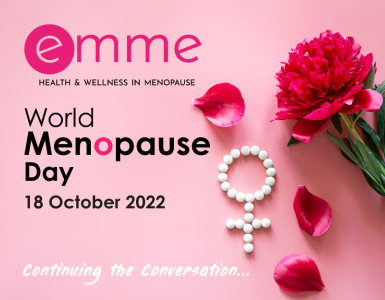Perimenopause. When did you first hear the word?
For many women, the symptoms of the perimenopause start in their early 40s (although it can be earlier or later) yet so many of us are completely unaware. We might know something about the menopause, and that it happens around the age of 50, but before that? It’s simply not spoken about by doctors or medics and it’s high time that changed.
Scottish writer, documentary maker and menopause campaigner, Kate Muir agrees
Kate says to iNews, “until recently, there was silence and ignorance around the perimenopause among women and even doctors, and only now is it getting the attention it needs”.
The perimenopause often affects women unawares, causing both physical and emotional symptoms. Due to the fluctuating levels of oestrogen, progesterone and testosterone (which is also a female hormone), each days’ symptoms can be different. Weight gain, hot flushes, night sweats, brain fog, anxiety, sleeplessness and depression are all common. Women can be left confused and alone, divorce rates among women in their mid to late 40s rise, and so do suicide rates.
Kate spoke to 48 year old Becky Maynard who says she was “knocked sideways by mystery symptoms
Becky has spent ten years working in international humanitarian crises, but the perimenopause was something else entirely!
At 44 years old, she was driving to home to Cornwall and had to pull over multiple times. “I kept thinking I was having a stroke or a heart attack. I drove into a layby, realising there was no way I could drive any further. I thought I was going to die”.
Thanks to a nearby lorry driver who tried some breathing exercises with her and called a friend, she was able to carry on three hours later.
Kate was diagnosed with panic attacks and assumed she was experiencing PTSD from her work
Cognitive behavioural therapy didn’t provide much help and neither did antidepressants. But her anxiety continued, she felt “utterly miserable” and started to gain weight.
When she started to think that her problems might be hormonal, she asked her GP about HRT, who told her to “come back two years after your periods have stopped”. When she started reading about the perimenopause, she decided to see a different GP about HRT.
It’s only in recent months that the UK’s NHS website actually mentions the word perimenopause
Kate Muir is the producer of the two Davina McCall menopause documentaries for Channel 4. Davina herself has said that she was 44 when she first noticed symptoms leaving her unable to read the autocue, thinking she was developing dementia.
Kate’s symptoms included “terrifying heart palpitations, overwhelming anxiety and sudden gaps in her memory bank”. An ECG proved that her heart was fine and her doctor put it down to too much coffee, not mentioning anything about the perimenopause or menopause. But as soon as Kate sought out HRT, her “memory rebooted”.
Shocked by the lack of support, Kate has written a book, Everything You Need to Know About the Menopause (but were too afraid to ask). During research for the documentaries, they discovered that 41% of women had experienced heart palpitations and 73% had experienced brain fog and memory problems. 69% experienced anxiety and 84% sleeplessness.
So it’s clear, GPs need to have these symptoms and their causes at the forefront of their prescribing pads. If you’re struggling and you think it might be hormone related, keep pushing to be heard and visit a different GP if you’re not.
Are you experiencing similar symptoms to Kate and Becky? How are you coping? Have you been offered help with your symptoms? Would you like to share your story? We would love to hear from you at info@emmememopause.com or DM us on Instagram @emmemenopause
















